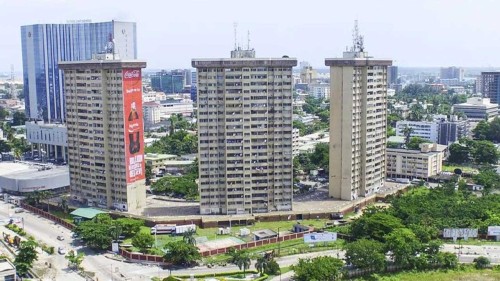A real estate firm, Messrs Andron Homes and Properties Limited, has said that the availability of decent housing for Nigerians is a key element of a great nation.
The firm also promised more affordable land and flexible payments for the citizens to bridge housing deficits in the country.
The Group Managing Director of the company, Adetola King, said this at an event to mark Nigeria’s 62 Independence anniversary in Lagos. He disclosed that the firm is committed to bridging the housing deficit in Nigeria and other African countries.
He said: “Our mission is to make housing affordable to Nigerians, regardless of social class remains a priority. Adron Homes have continued reaffirming confidence in a great Nigeria, where basic facilities will be available. A glance at world events would certainly give us reasons to be thankful. Undoubtedly, we may not yet be where we want to be, but as our democracy evolves, things can only become better.
“We deem it fit to celebrate with the nation by offering a 50 percent discount in all our estates. We take pleasure in offering a variety of ready-to-live apartments and housing solutions with ultra-contemporary designs that meet international standards at reasonable prices.”
• How country can improve on rating, by experts
Nigeria has been scored low in the 2022 Global Real Estate Transparency Index (GRETI) released by JLL and LaSalle Investment Management. Out of 156 cities across 94 countries and territories covered globally, Nigeria was ranked 60.
GRETI has been charting the evolution of real estate transparency across the globe since 1999. Updated every two years, this edition, the 12th, is based on a comprehensive survey of the availability and quality of performance benchmarks and market data, governance structures, regulatory and legal environments, transaction processes, and sustainability instruments.
The report revealed a widening transparency gap, as leading countries pull further ahead and set higher standards, from new regulations covering energy efficiency and emissions standards for buildings and climate risk reporting; to raising the bar for Anti-Money Laundering (AML) and beneficial ownership reporting.
It also provides deeper data on everything from office utilisation rates to niche property types, supported by the rapid uptake of technology. Progress lower down the global rankings has been slow, as many jurisdictions plateau or even regress and they will need to move faster to meet heightened expectations.
Pressure has continued to grow for the real estate industry to meet the challenge of decarbonization. Sustainability – and the race to net zero emissions – has become the new marker of transparency as investors, companies, governments, and the public look for clear long-term targets, regulatory standards, and metrics to measure their environmental impact and risk.
Sustainability has been the biggest driver of transparency improvements across markets in GRETI 2022, with the increasing number of countries and cities setting mandatory energy efficiency and emissions standards for buildings and the more widespread adoption of green and healthy building certifications. The leading markets are now also beginning to mandate sustainability reporting from companies and are collecting public building-level information on energy efficiency and emissions.
However, sustainability measures remain among the least transparent globally and the fractured regulatory landscape – with different standards being set at the municipal, state, regional,al and country levels, and a proliferating array of sustainability credentials, benchmarks, and standards – is making it increasingly difficult for investors and companies to navigate and understand their responsibilities.
Alignment of regulatory initiatives, harmonization of targets, and more standardized data will be needed to help improve transparency and enable companies to achieve their decarbonization targets.
Besides, the drive to improve productivity and uncover new revenue streams in the industry, as well as to respond to changes in how we live and work after the COVID-19 pandemic – has spurred a rapid increase in the use of real estate technology platforms. The availability of new, high frequency data and more granular data is boosting the transparency of real estate in ways that were unimaginable just a decade ago.
In some countries, the result is a more in-depth understanding of buildings and markets than ever before, from real- time occupancy or foot-traffic tracking to data aggregators, compiling information on developing asset types, and even the use of building and city-level digital twins for urban planning and forecasting.
The maturing real estate technology ecosystem has the potential to significantly boost transparency. However, the use of new technologies is highly varied across organizations and markets, the landscape of solutions and providers are complex, and many tech standards are specific to individual companies or use cases.
The Sub-Saharan Africa region has seen improvements continue to stall for the third consecutive survey, following limited progress in 2018 and 2020. Kenya launched Ardhisasa (a national land information system) and new beneficial ownership regulations.
Nigeria gained the latest rating due to the establishment of the Lagos State Real Estate Regulatory Authority and the development of an online portal for planning applications.
Chief Executive Officer, of LaSalle Investment Management, Mark Gabbay, said: “We believe that a robust global benchmark is an essential tool for the real estate industry. Transparency is the foundation, which allows corporate occupiers, investors, and lenders to operate and make decisions with confidence.
“We very much hope that our 2022 edition meets this challenge and provides a truly objective assessment of real estate transparency across the world, which in turn contributes to higher standards that ensure healthy real estate markets that work for all stakeholders.”
Experts, however, believe that Nigeria can improve more in ranking, if there is deliberate and concerted efforts in building real estate data infrastructure, enthroning cashless economy, optimising development approval and control processes, liberalising issuance of property titles and establishing title registry, securitising real estate assets and adopting technology in the real estate development.
The Managing Director, NISH Affordable Housing Limited, Yemi Adelakun, said lack of essential data must have been responsible for the low ranking of Nigeria in the index. For example, Nigeria’s housing deficit figures have been difficult to ascertain or estimate over the years.
He said: “This is a major challenge for growing real estate sector in Nigeria. Data is vital for planning, implementation, monitoring, evaluation and reporting in all sectors, especially in real estate.”
According to him, the prevalent cash economy makes tracking and trailing funds invested in real estate a daunting task, while huge dead capital locked up in Nigeria’s real estate arising from difficulties in obtaining property titles and the consequential effect on securitisation of real estate assets.
“Inefficient process of development approvals and ineffective development control resulting in incessant building collapse may also have been responsible for the low ranking,” Adelakun added.
Vice Chairman, Nigerian Institution of Estate Surveyors and Valuers (NIESV), Lagos State branch, Mr. Gbenga Ismail, said: “Our market is opaque. The Nigerian property marketplace is not clear and consistent. For this reason it is difficult for them to be confidence in our market.”
Ismail, who is the Vice President, Lagos Chamber of Commerce and Industry, called for improvement in some the efforts being made in land registry, consent process, regulation and data capture.
He said: “Once there is consistency in the market fundamentals then clarity and transparency will come naturally. Documentation, standardisation, process standardisation and efficiency, data integrity all needs to be apparent.”
The President, Real Estate Developers Association of Nigeria (REDAN), Aliyu Wamakko, said there must be a shift in housing provision and government concentrating on policy formulation.
According to Wamakko, there should be a policy by the government that all monies budgeted for housing should be channeled through the private sector. Such policy, he said, would create employment for the youths, rejuvenate the economy and provide affordable housing.
Real estate practitioners have identified creativity as one of the essential tools needed for wealth creation, especially in the real estate sector. They spoke, at the weekend, during Mega Summit 2023, entitled: ‘Strategies for Increased Financial Growth’, organized by TeamFocus Realtors Group in Lagos.
The practitioners, who spoke at the summit, included the Managing Director/Chief Executive Officer (CEO), Adozillion Realty, Dr. Simon Adozi; Paul Foh and Managing Director/CEO, Own Your Life institute, Dr. John Mukoro.
Others are Ace comedian, Atunyota Alleluya Akpobome, alias Alibaba, who said there were other imperatives needed to aid creativity for sustainable wealth creation. This includes skill technology, information, mentorship, experience, teamwork, self-education, goals, sane mind, healthy competition, publicity, communication skills/review mechanism, among others.
Similarly, Adozi, Foh, and Mukoro urged realtors and real estate professionals to leverage on capacity building through self-development and confidence, the acquisition of knowledge, honesty, doggedness, and the setting of long-term but achievable goals.
They further advised realtors and other participants to pay less attention to short-term monetary gains and to focus on future gains. Speaking on why the group organized the summit, the company’s Director, Public Relations, Mrs. Uche Amatokwu, said it was the firm’s way of reaching out to many growing realtors and other real estate practitioners, as well as empowering them through training.
Also, the group’s President, Mrs. Olubukola Oloruntoba, said the free summit was in line with the firm’s slogan, ‘TeamFocus-inspiring You for Growth, which is like “building a family of achievers in the real estate business across the country and beyond.”
Highlights of the event was the presentation of a car by Signature Lottery Homes, to Mukoro, as its outstanding realtor, gifts presentation to winner realtors, and testimonies, among others.
There are several strategies to market real estate, including:
- Online Listings: List your property on popular online real estate portals like pillarcom.net, propertymart, jiji, Realtor.com, and others. Ensure that the listing has a complete description of the property, high-quality photos, and accurate information.
- Social Media: Use social media platforms like Facebook, Instagram, Twitter, and LinkedIn to promote your property. Post photos, virtual tours, and information about the property to attract potential buyers.
- Open Houses: Host an open house to allow potential buyers to tour the property. This will allow them to see the property in person, ask questions, and gain a better understanding of the property.
- Print Advertising: Use print advertising such as brochures, flyers, and postcards to promote your property. These can be distributed at local businesses or mailed to potential buyers.
- Real Estate Agents: Hire a real estate agent to help you market and sell your property. Real estate agents have access to a wide network of buyers and can provide valuable insight and expertise on how to effectively market your property.
- Virtual Tours: Create a virtual tour of your property to allow potential buyers to view the property online. This can be done using 3D imaging technology, which provides a more immersive experience for potential buyers.
- Networking: Network with other real estate agents, investors, and industry professionals to gain exposure for your property. Attend local real estate events, join local real estate associations, and participate in online forums and groups to connect with others in the industry
- Be patient: Real estate deals can take time to close, and it's important to be patient and not rush into decisions. Taking the time to carefully evaluate each opportunity and make informed decisions can help you avoid costly mistakes.
- Continuously educate yourself: The real estate industry is constantly evolving, and it's important to stay up-to-date with the latest trends and developments. This includes attending industry events, reading industry publications, and seeking out opportunities for continuing education and professional development.
- While there are no secrets or shortcuts to success in the real estate business, following these tips can help you build a successful career in this exciting and dynamic industry.
- Be patient: Real estate deals can take time to close, and it's important to be patient and not rush into decisions. Taking the time to carefully evaluate each opportunity and make informed decisions can help you avoid costly mistakes.
- Continuously educate yourself: The real estate industry is constantly evolving, and it's important to stay up-to-date with the latest trends and developments. This includes attending industry events, reading industry publications, and seeking out opportunities for continuing education and professional development.
- Stay organized: Real estate deals can be complex and involve a lot of paperwork and deadlines. It's important to stay organized and keep track of all the details involved in each transaction. This includes having a system for managing contracts, financial documents, and other important information
While there are no secrets or shortcuts to success in the real estate business, following these tips can help you build a successful career in this exciting and dynamic industry












-
·
·HMM GRT